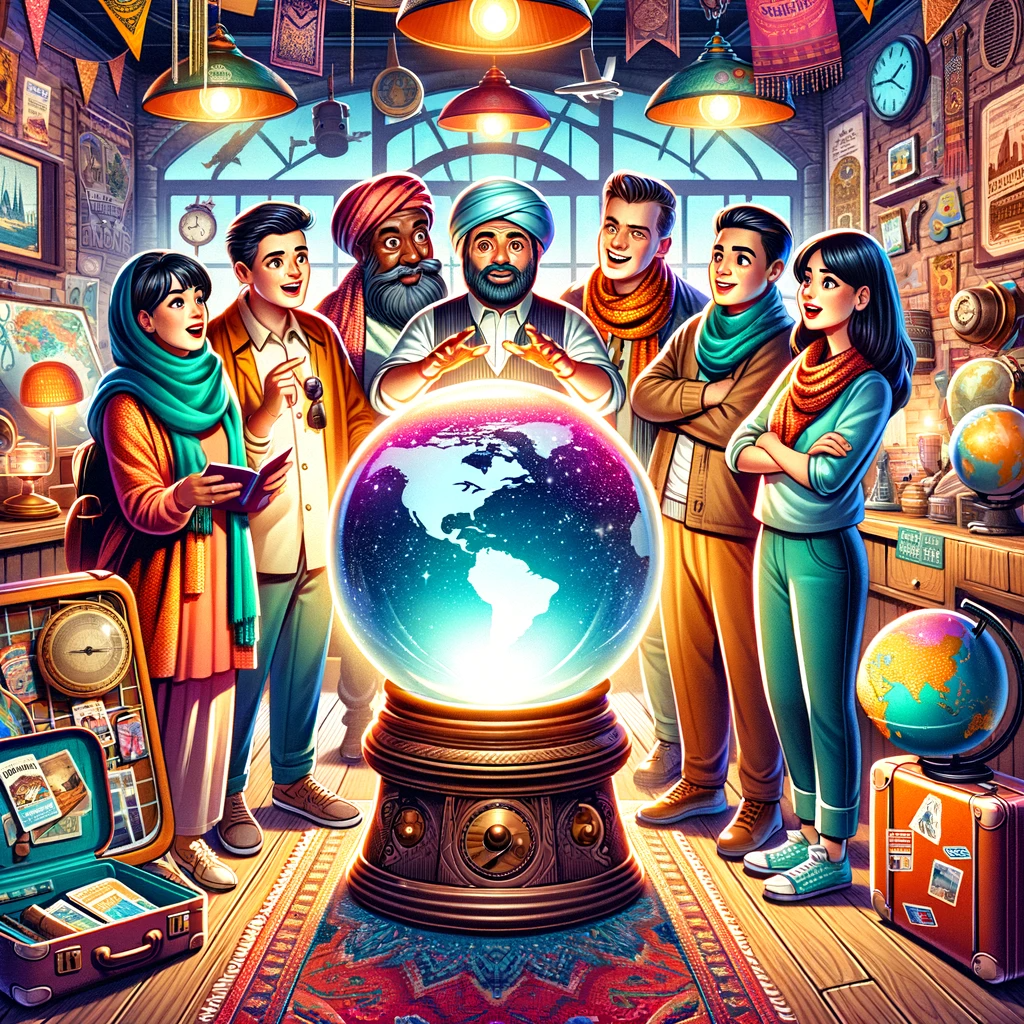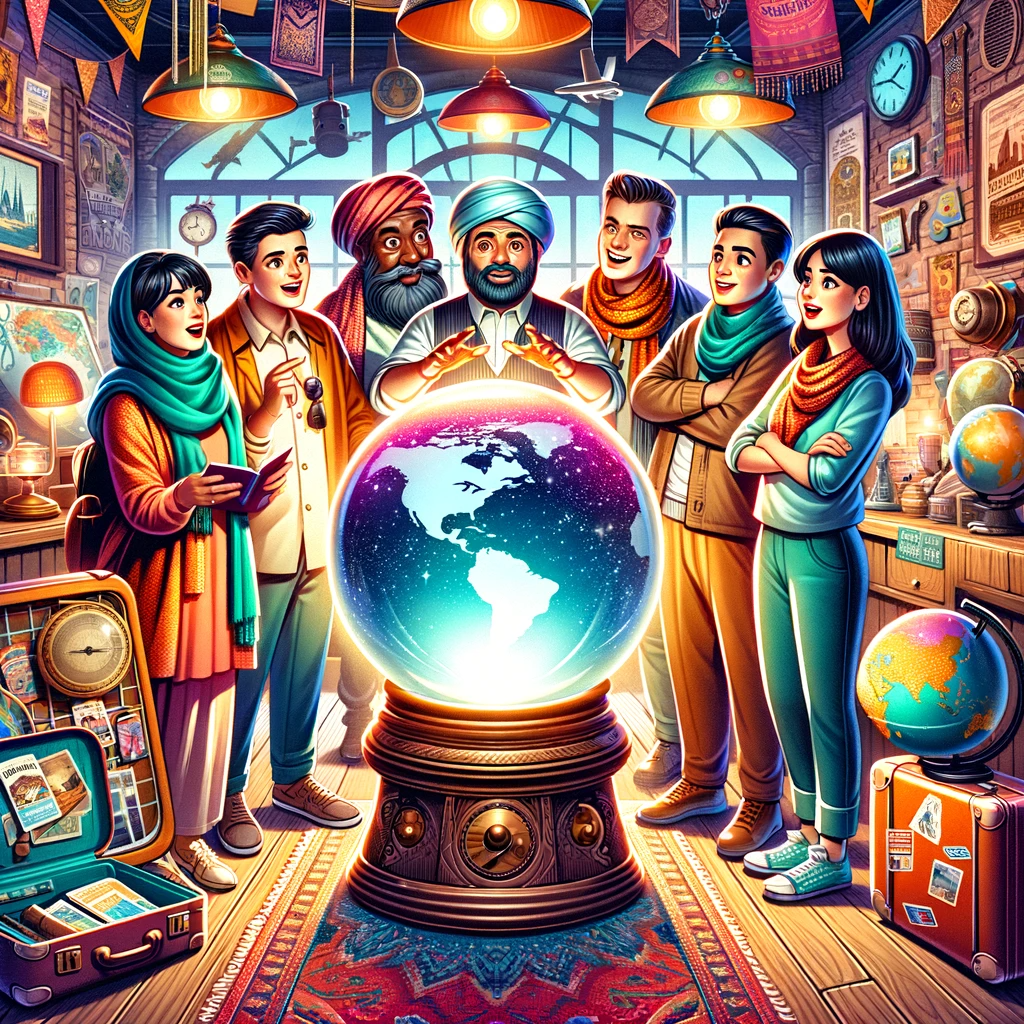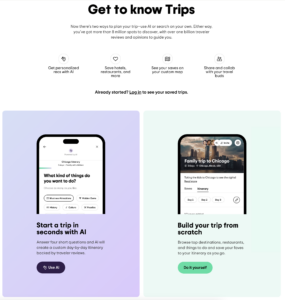
What should sightseeing OTA marketplaces do about AI?
January 3rd, 2024
by Alex Bainbridge
The new year period is a time of reflection. With that in mind, I realised that most of my recent focus has been on what can startups do with AI, or what can tour operators do with AI.
But what about the current generation OTA marketplaces, how can they adapt to AI? Are they destined to be a decade-long phenomenon, forever remembered in travel industry history as an example of what happens when the digitisation of retail outpaces the digitisation of experience delivery?
What should sightseeing OTAs do?
Ranked in near term likelihood of action, most likely first.
1 – AI itinerary builder
Use AI to enable consumers to design their own itineraries. For example see https://www.tripadvisor.com/Trips from Tripadvisor.
Why do this?
Marketplaces are fundamentally about retail. Tripadvisor CEO Matt Goldberg, via Phocuswire, said that users of their itinerary builder “generate on average three times higher revenue than the average Tripadvisor member”. AI enabled itinerary builders seem great for retail.
Why don’t do this?
This functionality sets a consumer expectation that may be hard to meet. Without a lot of development work, AI delivers possible experiences rather than memorable experiences. The experience industry should be optimising for memorability.
Well funded travel startups have tried trip planning many times over in the last decade, none have broken through. Is AI the necessary tech difference to make that leap?
A tough technical execution, probably only within reach of leading OTA marketplaces. Potentially also solved via acquisition.
Overall
Ultimately, a good holding position and because Tripadvisor is reporting early success, likely to become a common feature on OTA marketplace websites. (Mobile is another matter, incidentally).
However if itinerary planning becomes a common feature, OTAs are going to have to look at what they can do that differentiates them from their peers. For Expedia this probably means something related to hotels, for Tripadvisor/Viator this probably means restaurants. Everyone else is late to the in-destination differentiation game.
2 – Personalised distribution
Personalisation is on everyone’s TODO list for 2024 but when executives talk about personalisation they mostly mean suggesting the right product to the right person. This happens at the top layer of the sector (the OTA marketplace) and doesn’t require any operating changes by downstream suppliers.
Personalised distribution however is personalisation that carries through the layers – so a vegan customer has their experience adjusted at point of booking, and that adjustment carries through to the experience itself operated by the tour operator.
Why do this?
Seems consumers want it….
“Consumers will increasingly migrate towards trusted and authentic digital platforms to discover and learn more about a location, such as content from trusted influencers and verified customer reviews. They will also expect more personalized travel options that make their planning process less fragmented and more flexible, in case their plans change”
Nils Chrestin – GetYourGuide CFO via Phocuswire
Why don’t do this?
The entire cross-industry tech stack (products, rez tech and even tour operators themselves) is setup for products that are wrapped up, moved around between companies, booked and then operated, just like hotels. For example a tour has a pre-made itinerary, a description, images, dates prices and availability.
With personalisation we need to handle specific needs. For example what happens if the customer is vegan? Or if they have mobility issues? Can you adjust the tour itinerary ad-hoc at point of retail for just that customer? With AI this is possible, but it needs a complete reworking of how tours are distributed, booked and operated.
Overall
The bigger question for the multi-product OTA marketplaces (e.g. those with hotels) is can you introduce personalised distribution in sightseeing & experiences but NOT introduce in hotels first? Or will sightseeing have to wait until hotels is finalised first, likely several years.
On this aspect GetYourGuide has the advantage as they can move within sightseeing first, leapfrogging other OTA marketplaces that have to consider their broader multi-silo strategies.
(In 2023 I invested 2 meetings a week on a cross-industry personalisation project based on verified credentials etc, this new tech layer is inevitable as will become obvious in 2024)
3 – AI tour operator
Use AI to operate experiences, like my AI tour operating platform Autoura, using AI tour guides.
Why do this?
It is very hard to move to personalised distribution and not use AI tour guides (even if just in a hybrid approach). Instead of operating 5 tours, 10 slots with 5 guests per slot, you are operating 100 itineraries with 2 guests a time.
OTA marketplaces can address this by operating their own AI tour operator platform, acting as the glue between components operated by their suppliers.
Why don’t do this?
Puts the OTA marketplace in direct competition with their current tour suppliers.
Overall
Inevitable that the market goes this way if personalised distribution becomes commonplace.
The early movers will be the OTA marketplaces that are focussed on attractions as they don’t have any worries about disrupting their tour operator supply base.
Should OTAs do anything at all?
Perhaps the larger question is, should OTA marketplaces do anything at all? What are the risks of inaction? (These are risks, but you can consider them as predictions too if you like)
- End of marketplaces – in the same way as Uber ridehail generates product when you access the Uber app (rather than the user selecting from 10,000 pregenerated A>B routes within a city), dynamic product generation will be how attractions and sightseeing is retailed going forward
- Tour product prices will deflate as a result of AI operated experiences – causing issues when wanting to push a growth story for IPO or other significant financial transaction needs. Need to sell higher volume just to keep revenue at current levels
- New entrants are well resourced and playing in the leisure market – Google, Amazon, Baidu & the entire automotive industry. Leisure will overlap with tourism over time, just like it does for Uber, OpenTable etc. The risk is that these new leisure platforms will solve tourism before tourism specific platforms solve leisure
Have OTAs felt the urgency to act yet?
“AI will never be a replacement for the passions that drive travelers to seek experiences in the first place. Even in a world wherein AI significantly improves the discovery and fulfillment of experiences, it will never replace the human connection at the heart of the experience“
Johannes Reck – GetYourGuide CEO via WebInTravel
Seems not quite yet. To me the whole “human connection” argument is like arguing about Youtube vs live theatre. Sure live theatre is better, but Youtube has so many more aspects to it, and if you are a global digital platform in the sightseeing sector, it is Youtube you want to be.
Final thought
OTA marketplaces DO have options, although difficult as all require reinvention of their current strategy. As a result, rez tech reliant on OTAs (not all are), they have challenges too. Perhaps thats another post.
If you haven’t seen it, take a look at my video from Phocuswright 2023. My vision for the sector doesn’t include OTA marketplaces….
Image: Dall-E via ChatGPT. Kind of a travel industry crystal ball style vibe

This content is protected by copyright. Link sharing is encouraged but duplication and redistribution is illegal



If you prefer to comment via LinkedIn, here is the thread https://www.linkedin.com/posts/alexbainbridge_what-should-sightseeing-ota-marketplaces-activity-7148284147172605952-tRwa